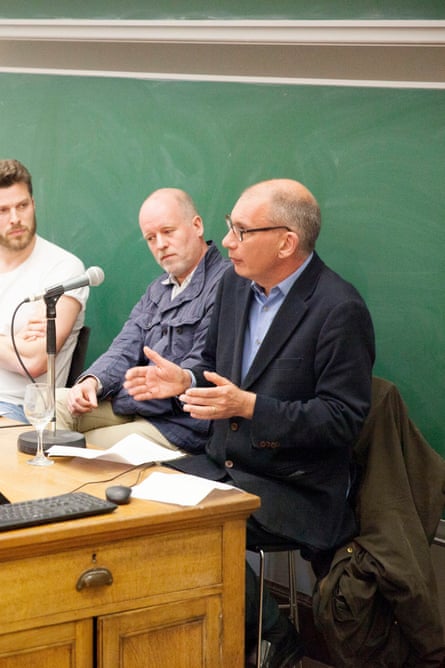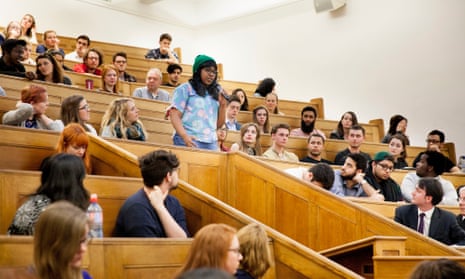The idea
You Talk, They Listen is a series of events we’re hosting at universities around the UK – each focussing on the topics you care about most in the run-up to the election; from higher education, to freedom of speech, climate change and immigration – young people talk and politicians listen. This time we focused on the new terror laws, and whether they threaten freedom of speech at university.
The panel
Henry Porter, writer and journalist
Nick Cohen, writer and journalist
Dr Jim Wolfreys, senior lecturer in French and European politics
Satvinder Singh Juss, professor of law at King’s College London
The chair
Rick Edwards, TV presenter and writer of None of the Above, a new book on why young people aren’t voting and why they should be.
The atmosphere
The discussion was rowdy and heated. There was a noticeable divide between the views of students and those of the panel, with many in the audience disagreeing with Nick Cohen in particular – and not afraid to tell him so.
Five top demands on free speech and student life
1) The counter-terrorism bill threatens freedom of speech. Mariya Hussain a student at King’s College London, kicked things off by saying that freedom of speech gives students power – but it is being taken away. “The counter-terrorism bill is a threat to our civil liberties,” she said. “BME students in particular are facing suspicion.”
One student said that there was already a suffocating stigma attached to Muslim students: “As a Muslim, I find it hard to express my opinion in seminars because people will think ‘oh the Muslim’s on one again’,” he said.
Satvinder Singh Juss pointed out: “It is not terrorism that threatens our liberties, but laws such as this one.”
2) We need safe spaces to protect marginalised groups. Cohen argued passionately for the principle of free speech. But he angered many in the audience when he said that students shouldn’t have safe spaces at university. “By safe, they mean safe from things that upset you,” he said.
Hannah, a student at King’s, disagreed. She said: “When I was 11 I was sexually abused, and if I came into a debate where someone said it’s fine to abuse a little girl, I would have a meltdown. Society is a dangerous place for marginalised people and that shouldn’t happen at university.”
Areeb Ullah, another student at King’s, pointed out that “safe spaces are important because they’re about safeguarding people who are systematically oppressed”.

3) Student union bans are not a threat to free speech. Henry Porter and Cohen again came under fire when they criticised campus bans. “You’ve got to think really hard about banning stuff,” Porter told a student who put forward the motion to ban Blurred Lines on campus. To which she quipped: “We did, but thanks for your condescension”. She went on to explain that the song was triggering for people who’d experienced assault.
Ullah agreed and said that you can’t equate campus bans with government bans. “You can’t conflate student unions and Teresa May,” he told the panel. “They’re not the same because she has power, she’s in government,” he said.
4) Violence isn’t just physical. “You are free to express anything as long as you’re not inciting violence,” Cohen told the audience – but he and the students disagreed on what constituted violence. Cohen dismissed the idea that triggering is a reason to ban. Triggering isn’t proof that something has incited violence, he said.
But many of the students disagreed. “Violence isn’t just physical violence, it can be psychological,” said an audience member who counsels LGBT students. Another told him: “The way you’ve described inciting violence is very simplistic. To you, expressing views that reinforce the systematic violence that women face doesn’t matter.”
5) You need to listen to the people who are oppressed. One student criticised the all-male panel (an invited female panellist had dropped out). “You decide what’s offensive and violent – but you need to listen to us when we talk. You need to listen to the people who are oppressed.”
Wolfreys emphasised the need for balance when talking about freedom of speech. “You want to have debate and discusson,” he said. “But at the same time you don’t want people to feel oppressed because of their sexuality, race or religion. So there are limits and they constantly have to be assessed.”
The candidates
When political candidates were invited to talk at the end of the evening, the Liberal Democrat candidate Belinda Brooks-Gordon was heckled on tuition fees, the Ukip candidate who followed her was jeered – but the closing Green party candidate was loudly cheered.

Comments (…)
Sign in or create your Guardian account to join the discussion